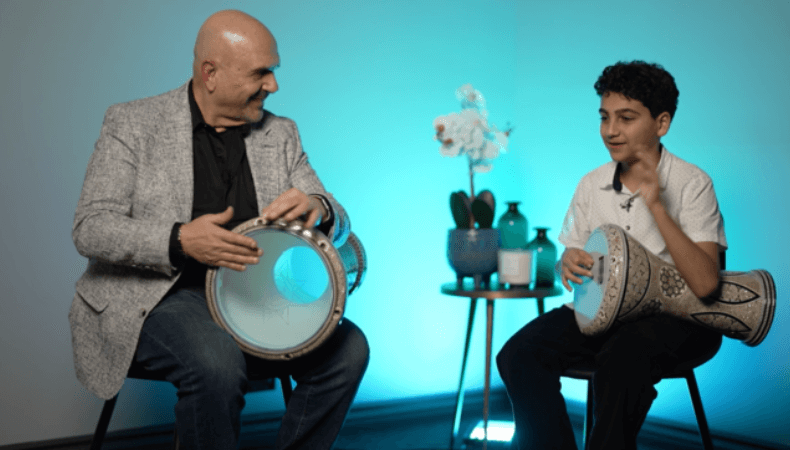Beyond Beats: Souhail Kaspar’s Grammy-Nominated Percussion Brilliance

In percussion, few names resonate as profoundly as Souhail Kaspar. A Grammy-nominated Lebanese American musician, Kaspar’s virtuosity spans a spectrum of percussion instruments, leaving an indelible mark on the global music stage. Beyond his musical prowess, Kaspar has become a beacon of inspiration for aspiring instrumentalists, particularly through his master classes that traverse continents.
Roots and Passion
Souhail Kaspar’s journey into the world of percussion began at the tender age of seven, guided by the keen ear of his musician father. Recognizing his prodigious talent, Kaspar embarked on a transformative three-year degree program at Nadi Al-Fonun Al-Arabia in Aleppo, Syria. It was here that he delved into the intricate theories and techniques of Arab percussion, sharing the stage with iconic regional singers like Sabah, Wadih El-Safi, and Farid Al-Atrash.
A Global Musical Ambassador
Having relocated to the United States, Kaspar’s acclaim soared with a Grammy nomination for the 2008 Iraqi song “When the Soul is Settled.” This marked the genesis of collaborations with Western musicians eager to explore the enchanting realm of Middle Eastern beats. His collaboration with British singer Sting on the timeless hit “Desert Rose” is a testament to his cross-cultural influence.
Bridging Musical Traditions
In a world where musical landscapes differ vastly, Kaspar serves as a cultural ambassador, unraveling the complexities that distinguish Western and Arab music. One such distinction lies in the maqams, the traditional Arab melodic modes. While Western music typically embraces eight to ten maqams, Arab music boasts over a hundred. This richness, particularly in North African Arab music, becomes a source of fascination for those seeking to immerse themselves in tradition.
For Arab youth residing in Western countries, Kaspar’s music becomes a revelation. The richness of the region’s musical heritage often underestimated or unknown, surprises and delights the newer generations. The discovery that the melodies resonating from Kaspar’s instruments are indeed “from our home” sparks a renewed interest and pride in their cultural roots.
Keep Reading
Contributions to Cinematic Soundscapes
Kaspar’s influence extends beyond the realm of pure music. His percussion artistry has graced the soundtracks of notable films such as “The Prince of Egypt” and “Sinbad.” In documentaries like “Darfur Now” and “The Great Bazaars,” his rhythmic contributions add a layer of emotional depth, showcasing the versatility of his craft.
Collaborative Ventures
As a guest percussionist with the renowned Kronos Quartet, an American string quartet based in San Francisco, Kaspar bridges the worlds of percussion and classical string instruments. This collaboration not only underscores his versatility but also contributes to the synthesis of diverse musical genres.
In Kaspar’s view, classical music forms the foundation of any musical journey. He emphasizes its pivotal role, stating, “You have to have classical music; if you don’t have classical, you don’t have anything.” This assertion underscores the enduring significance of classical traditions in shaping contemporary musical landscapes.
Conclusion
Souhail Kaspar’s journey unfolds as a narrative of cultural fusion, rhythmic exploration, and a commitment to nurturing the musical spirit in the youth. As he continues to inspire through master classes that span the globe, his impact reverberates not only in the beats of his percussion instruments but also in the hearts of those he motivates. The next generation of instrumentalists stands poised to inherit not just musical techniques but a rich tapestry of cultural heritage.


